GASTROTURF
Dinner Gongs & Wine Stewards: Ode to a small-town hotel
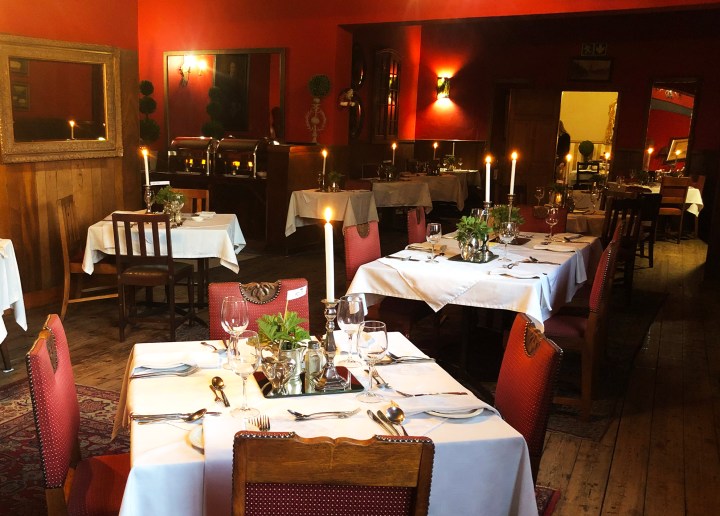
The dinner gong. A man in a black and white uniform and a little red bowtie gliding along the hotel corridor, tapping out a lonely tune on a xylophone, past bedroom doors behind which is a mom and a dad, and a boy at the basin in the corner washing his face, pouring a little Vitalis into his palm, rubbing it in his hands and then into his hair. He smooths it down, twirls a little kuif above his forehead, and follows his parents down to dinner.
The aroma came first, and you all followed. It was the fish poaching in a court-bouillon that you always smelt first as you trod down the staircase towards the double glass-paned doors to the hotel dining room. You’d anticipated the dinner gong, as you’ve always called it, although some inns had gongs, others a xylophone. You’d all have dressed for dinner and be seated on wooden chairs at a corner table. You’d watch as, across the room, the double-hinged doors to the kitchen would swing in, and then out, as waiters came out bearing trays of soup or fish and others went back in, arms laden with white Continental china, ready for the sink.
The fish would be your second course. The first would have been a soup, often cream of tomato, or cream of chicken, occasionally a consommé, and sometimes celery; always perfectly made, a lesson in how to make a simple yet compelling soup. Like a piano sonata in which every note is exactly as and where it should be; and unlike a badly made broth, out of balance and discordant. That would be one in which there are simply too many notes, as the emperor would have had it of Mozart.
The main course would follow in short order. You generally did not get many choices in those days; and the days recalled here are the mid-Sixties, when you were a little boy in the back of a white 1964 Cortina GT with a red flash along the sides, and red bucket seats within.
These were times when your parents had survived a war that had ended barely 20 years before – as recent as 1999 is to us now. Those who had not survived were only memories, the missed and regretted ones who were not to see their 30th birthdays. Not even close. So this generation was undemanding of life; grateful only to have it. If, today, there would be whinging about the paltry choices on offer, then you were only too grateful that you could have not only the main course and dessert, but a small bowl of soup and a modest portion of well-sauced fish first. That there was even a cheese board afterwards was a lavish treat. My own generation, consequently, largely still remembers what life meant to our parents’ generation. If you were a thoughtful and observant kid, as I was, you knew what life’s value was to your parents who had survived a war, and would never forget. And nor would you.
There’d be a neatly typed menu, just one page, at the centre of the table, fastened by a wooden holder. You’d pass it around or mom or dad would read what it said. Cream of celery soup, poached cob with parsley sauce. There’d be two choices of main courses. Tonight’s were Roast Beef and Yorkshire Pudding with roast potatoes and vegetables, and Suprême of Chicken with new potatoes and peas. Dad would choose the beef, mom the chicken. You’d have to choose either Pears Belle Hélène for dessert, or vanilla ice cream. This was a neatly cut rectangle of firm-textured ice cream on a side plate, with a triangular wafer stuck in it. You didn’t get to order Chico the Clown. Spur ranches hadn’t been invented yet. War survivors weren’t given to making food look cute to get their kids to eat. You’d bloody eat or do without.
They’d arrived in Cape Town aboard the Edinburgh Castle in 1952, shortly before Christmas, to settle in a diamond mining town far from anywhere. So the annual escape into the car and across the bridge, to travel the 700 miles to Cape Town and a few days later up the Garden Route and on to Durban, in another year via Kimberley and Bloemfontein, was looked forward to for the entire year. And it was the small-town hotels that punctuated every journey, and which were the holiday memory that always leapt to front of mind whenever you’d reminisce, for the rest of your life.
And the city ones. The Ritz Hotel in Sea Point. Not the current tower with its revolving restaurant in the sky. This Ritz was only two storeys high, as my mind now pictures it, and painted pink – walls and roof – with a dining room much closer to terra firma, and a long, narrow lounge along the front where you’d order tea and dainty cakes.
The Milroy Hotel, where twin apartment blocks are now on the Three Anchor Bay beachfront. Where dear old George, a stocky, smiling, white-haired Indian man, would serve you your cola tonic and lemonade, dad his brandy and ginger ale and mom her gin and Oros. One chilly July morning you zipped up your green jerkin and walked across the road to the pavement palm trees, then only a metre or two high. The adult you cranes his neck to see their tops now.
The Bay Beach Hotel just around the Beach Road bend towards Mouille Point, opposite the Putt-Putt, which is still there, untouched since the Sixties, though the hotel is long gone, replaced by an apartment block disguised as a cruise liner’s superstructure. In the old place, Danny, the young wine steward, would bring you your coke in the big lounge after a round of Putt-Putt. You’d walk from there to Sea Point Main Road, to queue at the Venezia corner ice cream shop for two scoops in a cone, one of hazelnut gelato, the other of lemon sorbet. That – Venezia – must be where today’s cool Cape Town street cuisine scene truly began.
More than those city hotels, it’s the country ones that endure in memory. It’s what first drew us to the Lord Milner in Matjiesfontein all those years ago. But, long before that, the Masonic and the Springbok, opposite one another in what was then the main road through Springbok, Namaqualand. We went through in mid-2018 and the place was hard to recognise. It’s grown madly, and the old main drag has to be found by leaving the main route altogether. But the old hotels are still there. We’d stay in one one year, the other the next, on the way back from the annual tour of the country. Either way, the dinner gong, the washbasin in the corner of the room, the double glass-paned doors, the soup, the fish… and Peach Melba one year, Pears Belle Hélène the next.
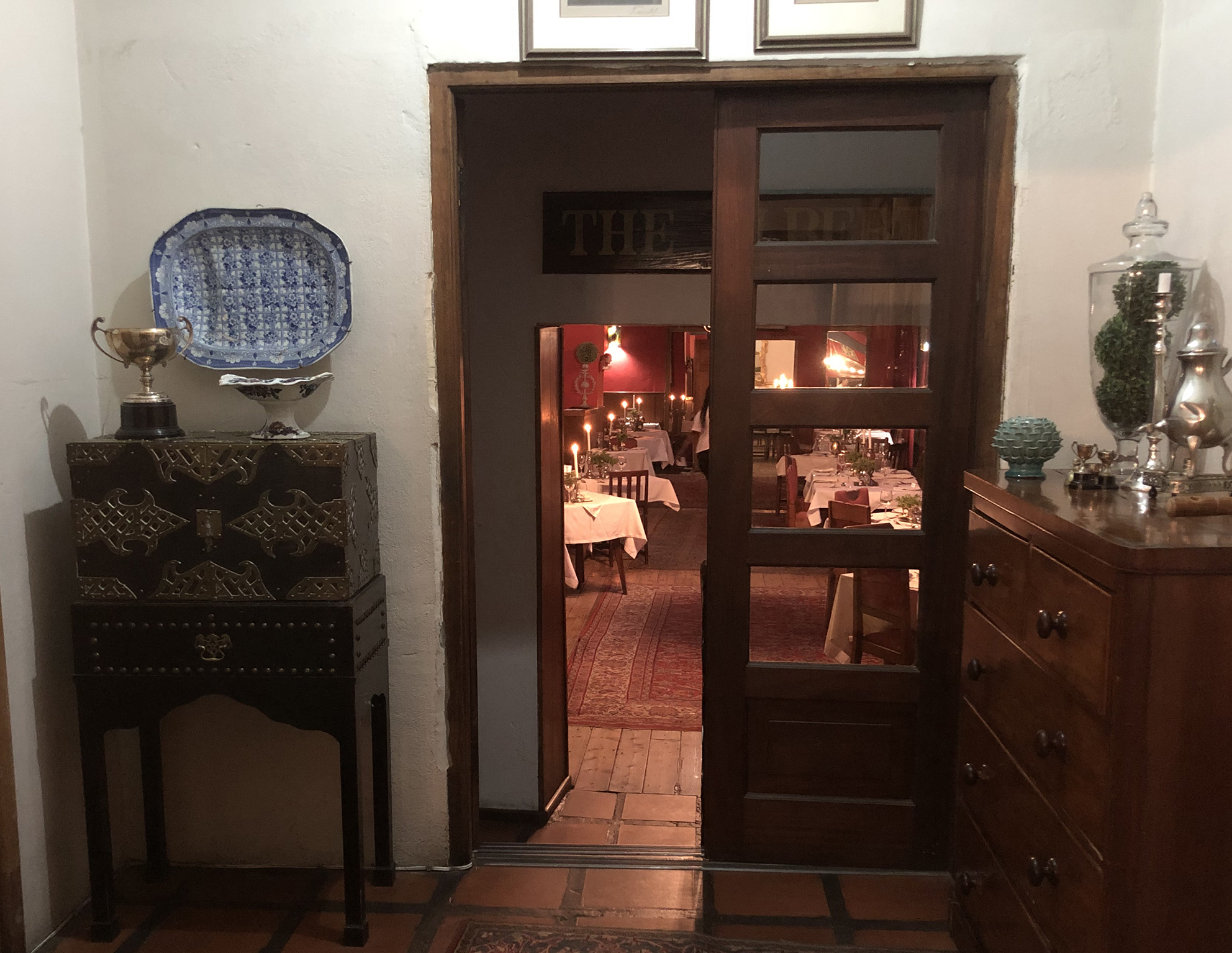
The glass-paned doors at Cradock’s Victoria Manor, leading to the red-painted dining room. Photo: Tony Jackman
Somewhere in the Karoo, and another dining room, that familiar aroma of poached fish. The buzzer on the wall, with a little sign next to it: “Ring for Service”. You’d press it and the wine steward would arrive with his tray and waistcoat. Just like when you were smaller, at the Bay Beach, and before that at the Milroy. You hadn’t grown up yet. You had yet to learn about politics, were yet to gain a social conscience. You were just a kid on holiday, in a dining room. You hadn’t realised that George, the elderly steward at the Milroy Hotel, had struggled all his life to pay for his son, Danny, the steward at the Bay Beach, to be schooled; that they both got a bus and a train home to Athlone every night, that they couldn’t live nearby, like you could, that they couldn’t go to the same “bioscope” as you, or to “your” beach, even share the same park bench in the Company’s Garden.
One day, years later, in the late Seventies, the 20something-year-old you would be listening to the Doobie Brothers’ Living on the Fault Line in your mom’s flat in Sea Point with your friend Yazeed, and you’d think, hey, we should go see a movie. Unthinking, you’d said it aloud. “Let’s see what’s on at the Van Riebeeck” … and his frown. It hadn’t occurred to you that you could listen to music together indoors, but thanks to petty apartheid you couldn’t go to a host of public places with your friend. You knew the law, but when it was suddenly there in front of you – and all you wanted to do was see a movie with your mate – it seemed such a ridiculous law that it did not even occur to you that to say “let’s go to a movie” was to ask the impossible. And inadvertently to offend a friend. And decades later you’re distant, geographically, but still close in ways that matter. And how absurd that seems now, looking back. Petty was the right word for it.
But back in the mid-Sixties, you were just a stupid, ignorant kid in the back of a 1964 Cortina GT. You’re no longer that ignorant kid, now – just five years ago – as you head for the Eastern Cape Town that’s to be your new home. It’s the hotel that first drew you there. Or, 21 years before that, its original tuishuise. Just six of them, then; ours was (is) called Opstal. Each one furnished with period bedsteads, wardrobes, sofas and armchairs, their kitchens filled with old wooden tables and chairs, decked with crockery from bygone times, and bone-handled cutlery. You wrote about that, back in 1993, for a motoring magazine, and the people started ringing up the owner, to make their bookings. And when you came through again, 17 years later in 2010, the lady in her big red coat, Sandra Antrobus, greeted you warmly, like an old friend. By then she owned her own hotel at the end of the same street, Victoria Manor, with her adjacent tuishuise now numbering beyond 30. Because serendipity brought us there.
It was only in 2010 that we first sat down in Sandra’s red dining room at Victoria Manor. The last time we’d been, in 1993, there’d been only those original six tuishuise. But it hit me even as I entered the double glass-paned doors to the dining room – the aromas of a Karoo buffet in the still night air, tables clad in silver atop rectangular mirrors, offset by red roses in silver vases, and we were offered cream of tomato soup – in the strangest way, this was home.
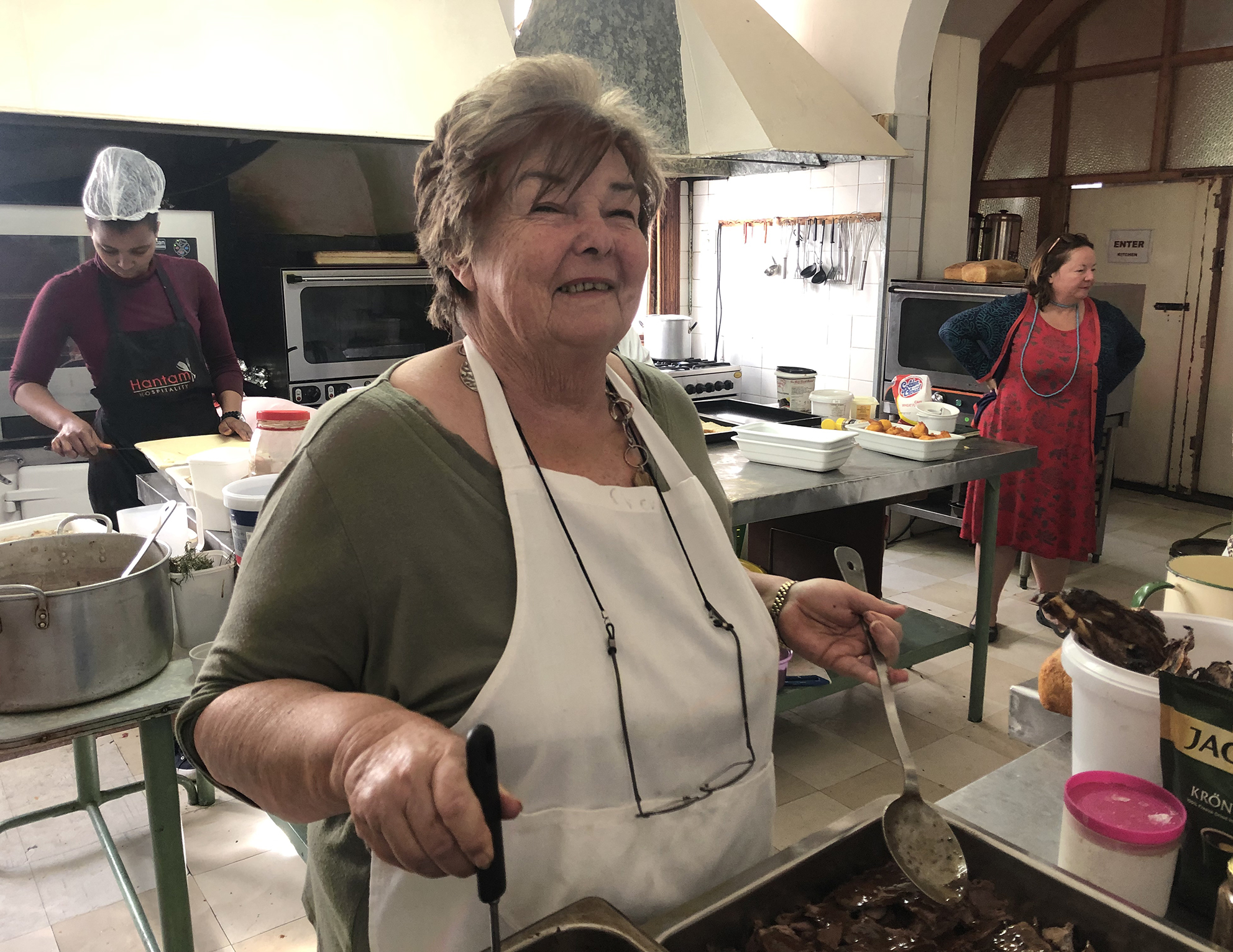
Sandra Antrobus – ‘Makhulu’ to her staff – in her kitchen domain at the Victoria Manor, Cradock, Eastern Cape, preparing dinner, with her staff, this week for hordes of punters at the annual Fish River Canoe Marathon. Daughter Lisa Antrobus brings up the rear. Lisa’s sister Cherie, who oversees the dining operation, was busy front-of-house. Photo: Tony Jackman
When we ended up directionless, adrift, those five years ago, it was Sandra who reached out a hand. A story once written had led to the oddest piece of serendipity in a life that has been punctuated with it – I’ve often said, bemused, that “serendipity follows me around” – and so you came to live in Cradock, brought there by a hotel and an appreciation of those old things; of bowls of consommé and Suprême of Chicken; of the ghosts of xylophones and the echo of the tread of a wine steward’s shoes in the corridor.
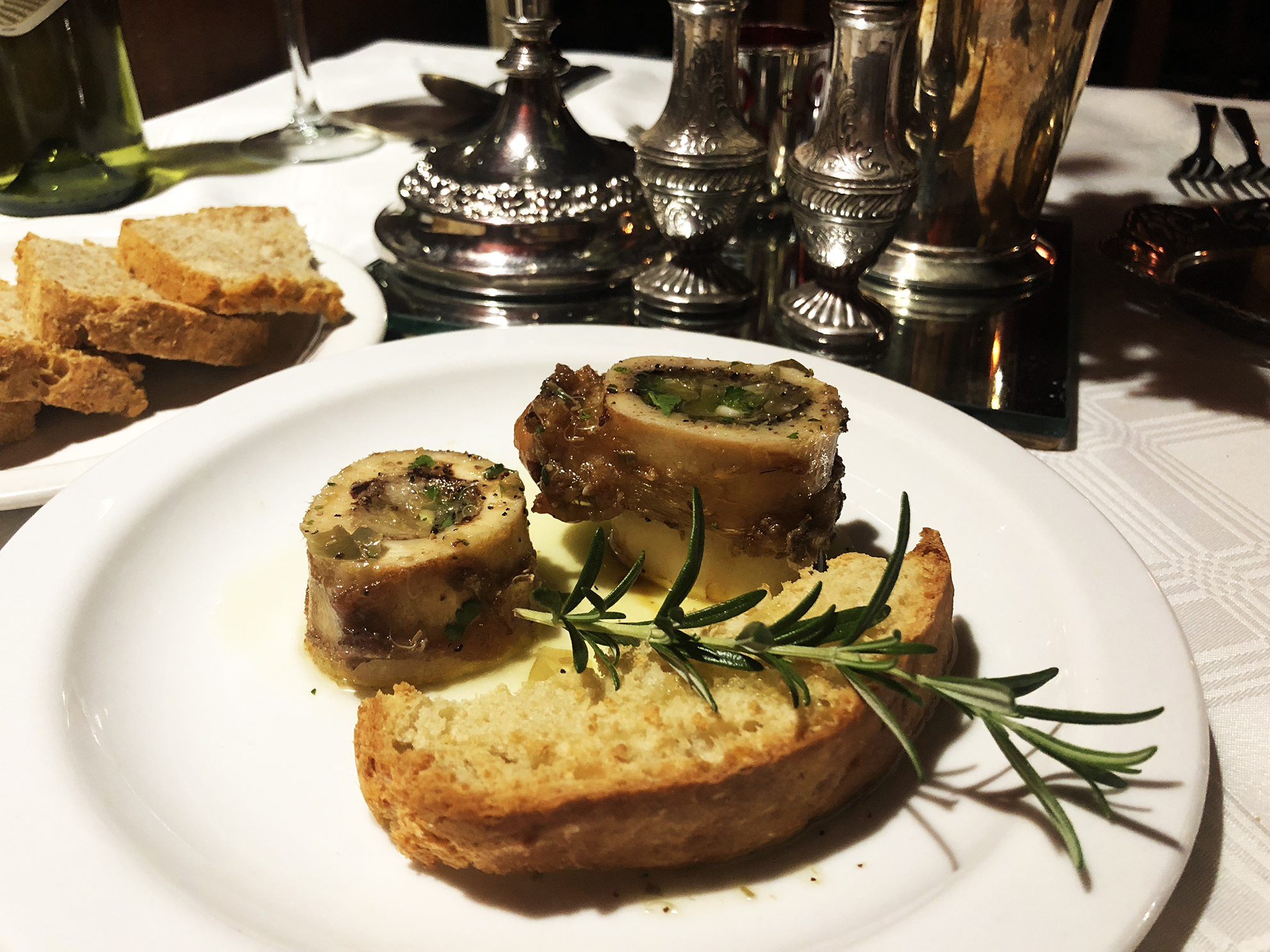
Dinner at the Victoria Manor on Thursday started off with marrow bones with capers. Photo: Tony Jackman
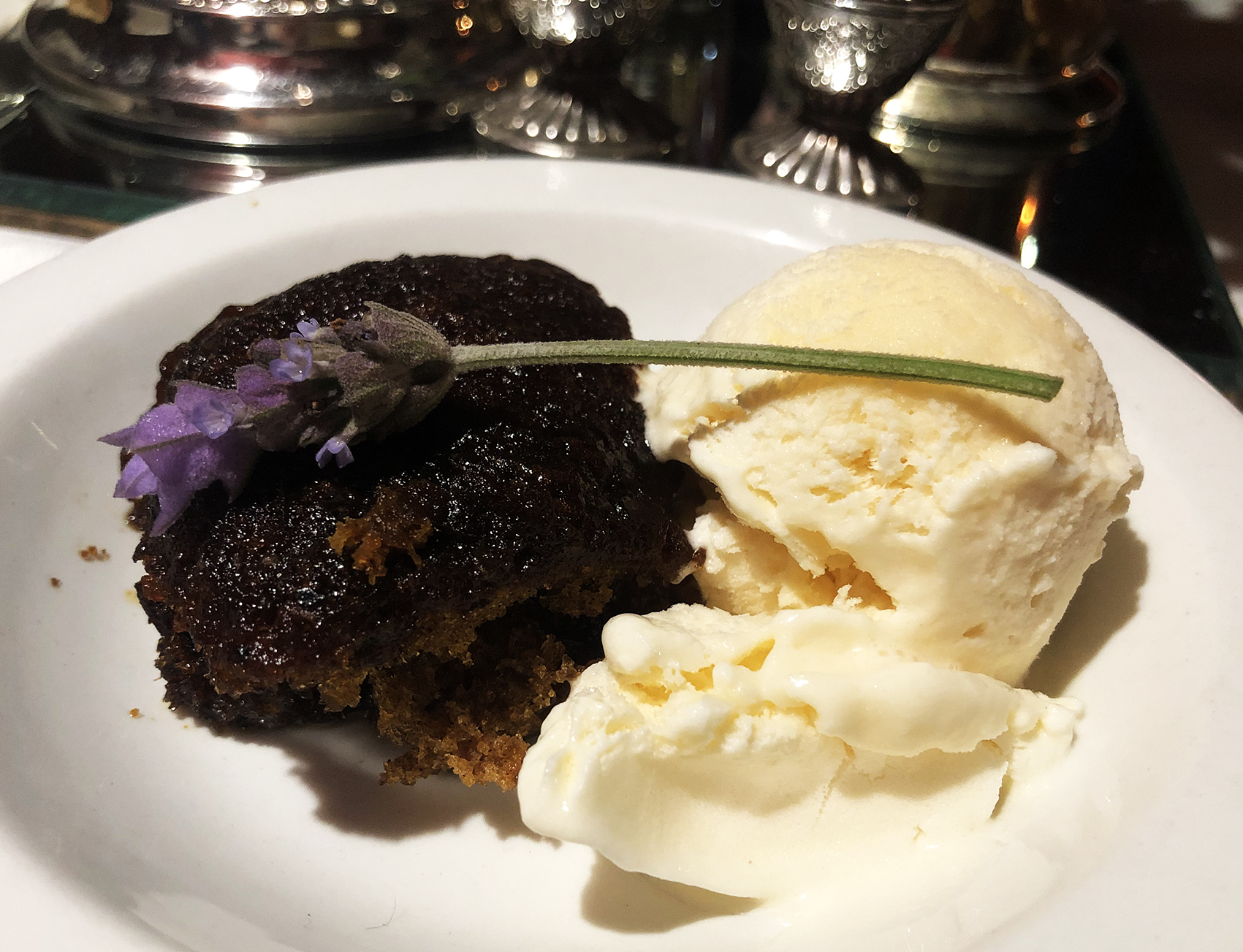
Good old-fashioned Cape Brandy Tart offset against the Victoria Manor’s distinctive table setting of silver reflected in a mirror at centre table. Photo: Tony Jackman
And now, as we turn the corner into our sixth year here, Sandra’s hotel – and always its adjoining tuishuise, they’re the heart and soul of it all – has been honoured with a national award, and I had to chase away a stray happy tear when I read about it this week. In the company of Franschhoek’s La Motte, Creation Wines of the Hemel en Aarde Valley, and Fryer’s Cove at Doringbaai on the West Coast, Cradock’s Victoria Manor and Tuishuise are the winners of the 2019 Wine & Food Tourism Awards in the category for Authentic South African Tourism Experience. Nothing was ever more deserved.
Small-town hotels led me away from my boyhood home, and to where I am now. It’s good to be home. DM
Read more essays about the old times, life and food in Tony Jackman’s foodSTUFF (Human & Rousseau), a cookbook-cum-memoir illustrated by 60 recipes, which was nominated for the Gourmand World Cookbook Awards (2018) in the category for best food writing. Book enquiries: [email protected]






 Become an Insider
Become an Insider